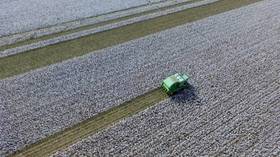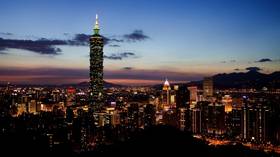Sweeping US ban on Chinese cotton could ‘wreak havoc’ on supply chains, major industry group warns

The US’ plans to block imports of cotton from China’s Xinjiang region over the alleged use of forced labor could be impossible to enforce, the US apparel association said, adding that the move may jeopardize global supply chains.
In addition to five Withhold Release Orders (WROs) targeting cotton, computer parts and hair products made by Xinjiang-based companies issued earlier this week, the Trump administration is currently considering a broader ban on imports from the region. New restrictions, expected to be announced in the coming days, may cover cotton and tomato shipments from the Muslim-majority Chinese province.
Also on rt.com US better look at its own ‘slave labor’ problem before banning imports from China - Professor Wolff to RT’s Boom BustTestifying at Thursday's hearing of the House of Representatives Ways and Means trade subcommittee, American Apparel and Footwear Association President and CEO Steve Lamar said that a “blanket WRO” would not have the desired impact on the alleged abuses in Xinjiang. Given that Xinjiang cotton makes up 20 percent of the world’s supply, it would be hard to quickly replace those imports and the whole industry may feel the impact of the ban, he warned.
“Such a WRO would no doubt make headlines, but it would wreak unending havoc to human rights, economic development, and legitimate supply chains – which are already battered by Covid-19 – all over the world,” he told the hearing. “As a country, we simply do not have the capability or capacity to implement, comply with, or enforce a blanket WRO. Given these constraints, such a WRO would take years before it would have its desired impact in China.”
The head of the industry group also noted that the cotton from the Chinese region can easily end up in final products made all over the world, “accounting for tens of billions of dollars of trade in supply chains that employ millions of workers.” There is no technology that can definitely trace the origin of the material, but the industry group believes that Xinjiang cotton is used in other apparel producing countries, including Bangladesh, Vietnam, Cambodia and Indonesia among others.
China’s Xinjiang has been put under the spotlight in recent months, with the US accusing Beijing of human rights violations in the region and oppressing the local Uighur population. The US Commerce Department has added dozens of Chinese entities onto its black list for involvement in alleged abuses, which Beijing has repeatedly denied.
Earlier this week, China said the US uses the alleged violations as a pretext to target Chinese firms. Speaking at a news conference on Tuesday, Chinese Foreign Ministry spokesman Wang Wenbin said the US imports ban was “sabotaging global supply chains.”
For more stories on economy & finance visit RT's business section














